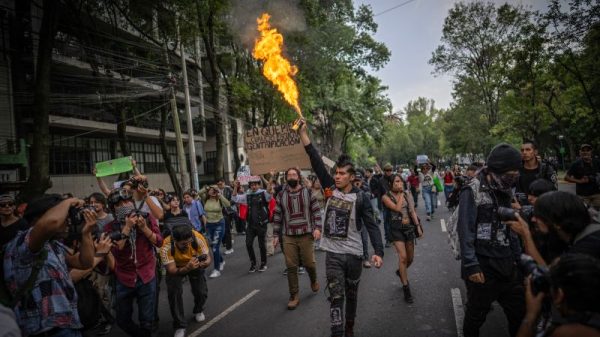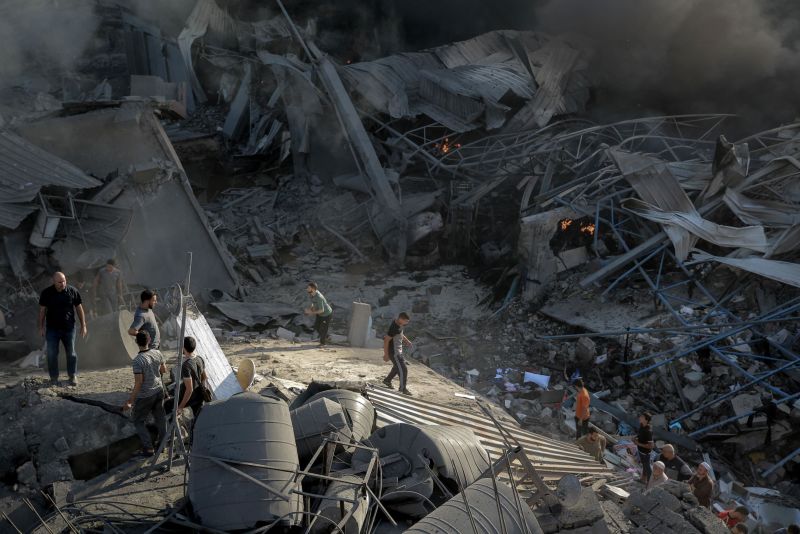Since Hamas launched its brazen October 7 attacks and Israel responded with intensive air strikes and a ground offensive, both sides have been accused of war crimes.
The conflict is covered by a complex system of international law developed after World War II, which attempts to balance humanitarian concerns and the military requirements of states. Delivering justice would be the work of many organizations over many years, but the process has already begun.
So who will decide if war crimes have been committed, what will the criteria be, and will anyone ever be held to account?
Which laws apply to the conflict?
Conflicts are governed by two bodies of law. The first, the law on the use of force, aims to prevent conflict by dictating the conditions under which states may resort to force.
The second, called the “law of armed conflict” (LOAC) or “international humanitarian law” (IHL), regulates the conduct of states during war and seeks to limit suffering once they have begun.
Modern IHL is built around the 1949 Geneva Conventions, which have been ratified by almost all UN members. The conventions have since been supplemented by Additional Protocols and by rulings at international tribunals.
Israel, however, has not ratified the first and second additional protocols, which were introduced in 1977 to cover areas like collective punishments and the use of new weapons. But since these provisions are considered a norm of customary international law, they are nonetheless binding on all states.
Some dispute whether international law applies to non-state actors like Hamas. But the State of Palestine – which is how the Palestinians are represented at the UN as a non-member observer – has acceded to the Geneva Conventions and its three additional protocols. Given this, Hamas – which governs a Palestinian territory – must comply with their terms. The State of Palestine is also a signatory to the Rome statute of the International Criminal Court (ICC), meaning Hamas leaders are accountable for war crimes.
Is there evidence of war crimes in the fighting between Hamas and Israel?
Not all violations of international humanitarian law constitute a war crime. A war crime is an especially grave violation of IHL. A UN report said last month said it was collecting evidence of war crimes in the wake of Hamas’ indiscriminate massacre of civilians and its abduction of more than 200 hostages.
The report said Israel may be committing the war crime of collective punishment, after officials ordered the “complete siege” of Gaza. A number of prominent human rights groups concur with the UN’s assessment.
When he visited the Rafah Crossing from Egypt into Gaza, Volker Türk, the UN High Commissioner for Human Rights, called the October 7 attacks “atrocities”, saying they – and the holding of hostages – were war crimes.
But he added “the collective punishment by Israel of Palestinian civilians amounts also to a war crime, as does the unlawful forcible evacuation of civilians.”
Some have argued Israel’s actions in Gaza constitute genocide. In an open letter, a group of UN experts said they “remain convinced that the Palestinian people are at grave risk of genocide,” although the crime is harder to prove under international law.
Other experts warn that Israel’s response, which has involved the displacement of more than a million Gazans from the north of the strip, poses a danger of becoming ethnic cleansing. However, ethnic cleansing still lacks a precise legal definition, and it is not recognized as an independent crime under international law.
What does proportionality mean?
Article 51 of the UN charter, which governs the use of force, gives states the right of self-defense, provided the force they use is necessary and proportionate. Proportionality is not about inflicting symmetrical harm. It means the defending state cannot use more force than is needed to respond to a threat.
Legal experts argue that Israel has considerable scope to respond to Hamas’ October 7 attack, and that its stated aim to “destroy” Hamas can be justified under international law.
Hamas has shown no intention to relent. Its founding charter mandates the killing of Jews and the destruction of the state of Israel. In an interview shortly after October 7, Ghazi Hamad, a senior Hamas leader, told a Lebanese TV channel: “We will do this again and again.” He said the attack was “just the first time, and there will be a second, a third, a fourth.”
While many consider Israel’s aim to destroy Hamas legitimate, others fear the force required to achieve this would be disproportionate.
“Some would argue that Hamas’s intent and capacity to launch future attacks makes it necessary to destroy it completely. But I would argue that the total harm this path would inflict on civilians renders it disproportionate. Israel has to settle for less than total victory.”
Israel must abide by a second type of proportionality under international humanitarian law. Under IHL, all states must minimize civilian casualties. Intentionally directing attacks against civilians is always illegal, but an attack that kills civilians incidentally can be legal if it achieves a military purpose, provided the harm caused to civilians is not “excessive” in relation to the military advantage anticipated.
When deciding whether to strike a target, Schmitt said commanders consult lawyers to complete proportionality calculations. Here, officials weigh expected civilian harm against expected military advantage. The greater the military advantage, the greater harm to civilians can be considered proportionate.
Schmitt, a former targeting officer and judge advocate in the US Air Force, said this calculation is “the hardest decision a commander can make on the battlefield, because there’s no bright-line test.”
The legality of a strike must be judged on the basis of information available at the time, rather than with hindsight. This makes forming a judgment on a particular strike a fraught task, due to the lack of information about how the IDF assesses the threshold for civilian casualties.
The sheer scale of Israel’s bombardment – which has destroyed nearly half of Gaza’s housing – could suggest Israel’s definition of “military targets” is at best loose and at worst potentially criminal.
“The amount of destruction is very, very significant,” said Sari. “I think it’s important and entirely appropriate to ask questions, robust questions, as to whether Israel is in all of these cases complying with its obligations. That is ultimately something for the IDF to answer.”
Can Israel target hospitals and refugee camps?
Israel’s targeting of civilian areas like hospitals has caused unimaginable suffering and drawn fierce criticism. After its strikes on the Jabalya refugee camp, which destroyed several buildings and, according to the Hamas-controlled Interior Ministry, killed hundreds, the UN said the attack could amount to a war crime, given “the high number of civilian casualties and the scale of destruction.”
While none dispute the horror of such attacks, legal experts are divided over whether they necessarily violate IHL.
“It is entirely legitimate and completely understandable to abhor the catastrophic consequences inflicted upon the civilian population as a result of the attack on the Jabalia refugee camp,” wrote Brian Cox, an adjunct law professor at Cornell University in the US, in a recent paper. “As unimaginably horrifying as those effects are, this reality alone does not render the attack illegal.”
Civilian buildings are protected under IHL, but protection is not unconditional. “They can lose their protection if they are used outside of their humanitarian function to commit acts harmful to the enemy,” Cordula Droege, chief legal officer of the International Committee of the Red Cross, explained in a video. Using buildings like hospitals to house combatants and weapons can turn civilian objects into legitimate military targets.
Hamas has long been known to station military operations inside buildings like hospitals – a practice known as “human shielding.” Human shielding is a war crime – but also a common military tactic during asymmetrical warfare.
“Human shielding is a horrific practice, but there is military utility to it,” said Schmitt, the law professor. “That is exactly why Hamas is encouraging people not to leave Gaza City. ”
And so it is possible for both sides to violate IHL in the same instance: Hamas by using human shields, and Israel by launching a disproportionate strike. The former violation does not excuse or permit the latter; any strike must abide by the principle of proportionality.
In response to the Jabalya strikes, the IDF said it achieved significant military advantages, damaging Hamas’ tunnels and killing dozens of its operatives, including Ibrahim Biari, a commander the IDF said was responsible for the October 7 attack. But whether the civilian harm caused by the strike was greater than the IDF expected, or whether it decided ex ante that such a level of destruction was nonetheless proportionate, is not clear.
Ultimately, however, the conflict may reach a point where such distinctions seem beside the point. An act can be legally justified and morally abhorrent. And even if the IDF can justify particular strikes under IHL, its actions may become constrained by public opinion. Huge pro-Palestinian demonstrations have been held across the globe, causing even Israel’s staunchest allies to temper their support as its window of perceived legitimacy shrinks.
“Even if a targeted strike may be justifiable from a legal perspective, first impressions frame the narrative,” noted a 2019 NATO report on Hamas’ use of human shields in Gaza. “Public opinion tends to be influenced more by images depicting the suffering of innocent civilians than by well-thought-out legal arguments.”
Who will rule on whether war crimes have been committed?
The ICC is an international court established to investigate individuals accused of committing the most serious crimes, such as war crimes. It steps in when governments are unable or unwilling to investigate alleged crimes committed on their soil. It opened in The Hague in 2002, but many of the world’s major powers – including the US, China and Russia – are not members.
Israel is not a member of the ICC and rejects the court’s jurisdiction. That has not stopped the court from investigating its actions in the occupied Palestinian territories. Fatou Bensouda, then the ICC’s prosecutor, spent five years conducting a “painstaking preliminary examination” and concluded she was “satisfied that war crimes have been or are being committed in the West Bank, including East Jerusalem, and the Gaza Strip.” But no arrests were made, and Bensouda left office in 2021.
While every government and military decision-maker must ensure they abide by international law, it is the job of the ICC to prove they have failed to do so.
Karim Khan, the current ICC prosecutor, said the acts committed by Hamas on October 7 are “serious violations, if proven, of international humanitarian law.” But he stressed “Israel has clear obligations in relation to its war with Hamas: Not just moral obligations, but legal obligations… It’s there in the Geneva Conventions. It’s there in black and white.”






































